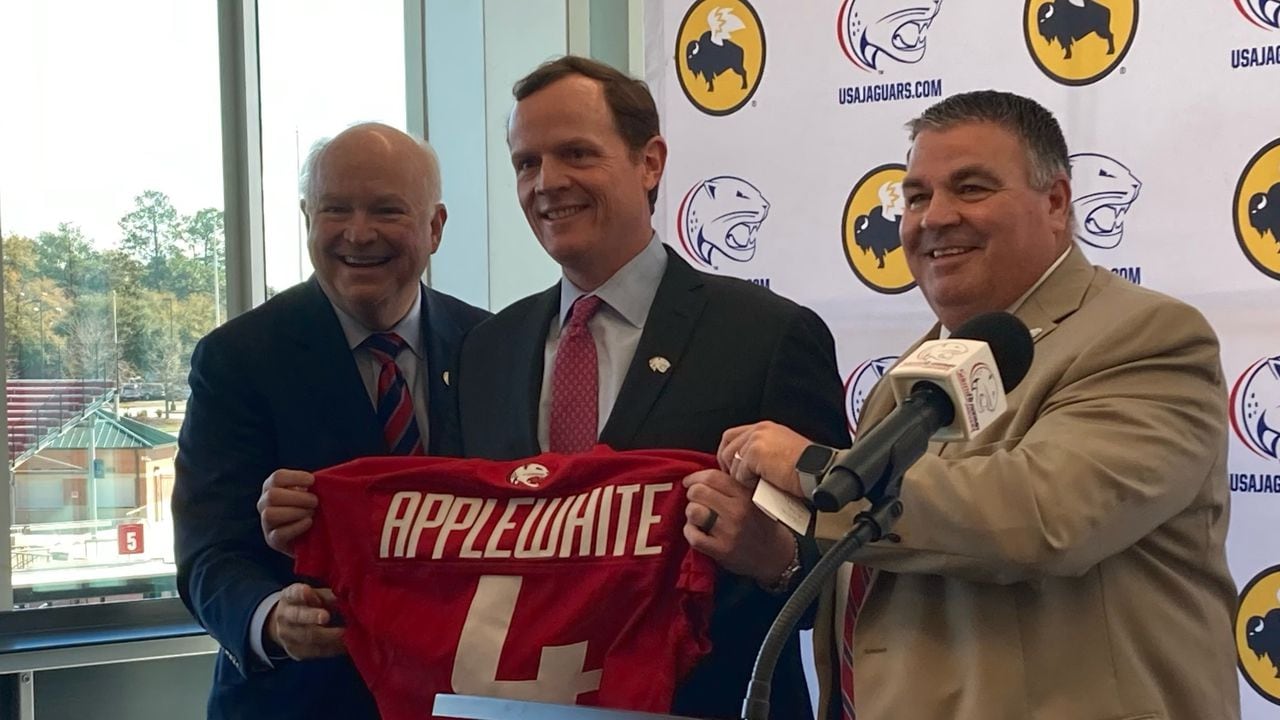Major Applewhite on what he learned from Nick Saban
Major Applewhite spent a total of three of his 45 years working for Nick Saban, but it’s clear that working for the recently retired Alabama coach rubbed off on him.
During his introductory press conference as South Alabama’s head football coach on Friday, Applewhite peppered his remarks with a few Sabanisms. When asked what he had learned in the years since his previous head-coaching tenure at Houston ended in 2018, Applewhite said the two seasons (2019 and 2020) he spent as an analyst with the Crimson Tide were highly influential, even more so than his season as Saban’s offensive coordinator in 2007.
RELATED: Major Applewhite: ‘The vision for this program is to win championships’
“Yes, we want to win,” Applewhite said. “Yes, we want to be the best in the field. Yes, we want to be physical, we want to dominate our opponent, we want to make them quit all of those things as a coach. But how do you get there? A lot of patience. There’s things that in my two years at the University of Alabama in an analyst role, watching Coach Saban — and he was different in 07 than he was in 2019 when I got there. But the patience, the understanding of thinking, seeking counsel from other coaches. You wouldn’t think the greatest coach in college football history would seek counsel from others, but he does.
“Being patient and slow to make decisions, because those decisions have consequences and that’s what you do as a head coach, as you make decisions. So you seek counsel and you listen and you trust and you make great decisions and that’s the way you make great decisions. So I would say that’s the overriding thing that I saw in the corner of that staff room, was someone who was low ego — although we would think he would have a high ego — very low ego and willing to listen and create the best opportunity and environment for his players to win championships.”
RELATED: Details on Major Applewhite’s South Alabama contract, his plans for coaching staff
In addition to twice working for Saban, Applewhite’s connection to the state of Alabama and Crimson Tide football goes back to before he was even born. His father, Larry (who was in attendance at Friday’s press conference), hails from Bogalusa, La., the same hometown as Terry Davis, Alabama’s All-SEC quarterback in the early 1970s.
Major Applewhite grew up in Baton Rouge, but still followed Alabama football. He had to, as Larry named his son (born July 26, 1978) after Major Ogilvie, a star running back for the Crimson Tide during that period.
“My dad grew up in Bogalusa and their family was really good friends with the Davis family and Terry Davis became the first wishbone quarterback for Coach Bryant,” Applewhite said. “So he started following his career and then, it was like being a Lakers fan in the 80s. It ain’t hard. Pulling for Alabama, being an Alabama fan in the 70s ain’t hard. So that’s where I got the name from.”
Applewhite has often talked of being a son of the “I-10 corridor,” which traces a line across the Gulf Coast from Texas all the way to Florida. And though he played his college football at Texas and spent much of his professional life working in that state, he still had plenty of associations with Mobile and the central Gulf Coast as a youth.
Applewhite spoke fondly of one visit to Mobile as a young man to attend the city’s premiere athletic event — one that also involved one of the Crimson Tide’s great stars. He’s had a passion for the Port City ever since.
“It’s faith, family and football in this part of the country,” Applewhite said. “Living in Houston, living in Baton Rouge, taking trips to see my grandmother in the summers in Hattiesburg. I went to the Senior Bowl in 1987 to see Cornelius Bennett play his last game over at Ladd-Peebles Stadium, about froze my tail off. I know it gets cold and wet too in the month of January and February.
“But I love the town. It’s a Gulf Coast town. You’re into football, you’re into fishing. It’s just a typical I-10 town — Baton Rouge, Lafayette, Mobile, New Orleans. It’s got that feel that people are different. They’re passionate down here for football. I’ve coached in a lot of different places but I want to coach somewhere where it is extremely important to win football games and people are like-minded.”
